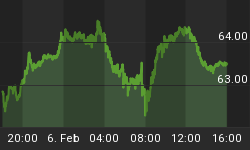"Gold isn't the long-term store of value that people think it is. It has no industrial use, and provides no income..."
SPARE A THOUGHT for the lonely gold analyst.
Yes, we get chance to huddle together every so often - Toronto in September or Hong Kong in October, plus a quick 48-hour jolly for members of the London Bullion Market Association in November (downgraded from Lima, Peru this year to Edinburgh, Scotland thanks to credit-crunched expense accounts at the investment banks).
And yes, gold analysts now enjoy a little more air-time on the media - and a little more respect from their equity-desk buddies - than they did 265% and ten years ago. But the word "nut" is still sniggered whenever gold gets a mention. That's despite beating every other asset-class hands down since the start of this decade.
"If you go back 25 years, gold was totally pointless until eight to 10 years ago," spits one London equity-fund chairman, quoted by the Financial Times alongside BullionVault's own recent analysis of typical seasonal price patterns in gold.
"It isn't the long-term store of value that people think it is," he went on. "It has no industrial use, and provides no income."
Full Disclosure: This chap's firm lost his Global Opportunities investors more than 32% of their money in the last 12 months. It came 179th out of 183 such funds in its sector. The UK Portfolio (15th out of fifteen year-to-July) hasn't even kept pace with inflation since launching in summer 2001. The Gold Price in Pounds Sterling, in contrast, has tripled.
But when it comes to useless, pointless and failed stores of value, who's counting? And as the funds' fact sheets remind us - after stating an aim of "long term capital growth" - "Past performance should not be seen as an indication of future performance." So there's hope for his clients yet.
Fund management itself, meantime, is a tough, competitive trade where hard work (successful or otherwise) is amply rewarded. Whereas gold analysts start on a hiding to nothing. Because there's nothing to analyze. There it sits, unchanging at No.79 in the periodic table, untarnished and indestructible. It never promises anything more than to remain unchanged - untarnished and indestructible - tomorrow. And that really is about it. Which is why any useful gold analysis will most likely spend its time talking about everything and anything else, otherwise known as the Zen approach to judging investment.
-
Unlike platinum, gold has little use in industry (13% of annual demand all told, versus 47% of 'white metal' demand from auto-catalyst makers alone);
-
Unlike government debt, it can't swell in supply, pumping cash into the economy and financing the world's trade imbalances. Unlike common stocks, gold doesn't offer income or earnings growth, making it impossible to value on modern investment metrics;
-
Even the cost of replacement is tough to pin down, whipping from $134 an ounce (the mining cost at Barrick's Lagunas Norte in Peru) up to $590 across Goldfield's African, Latin American and Australian output on average.
Not that quality varies, however; fine gold is fine gold (look for 99.5% or better, the Good Delivery standard of the deep, liquid professional market, in which the internationally-averaged Spot Price is acknowledged everywhere, albeit with an occasional premium the further East you move from London). And not that the stuff ever does need replacing, of course. Because as we just said, it's indestructible.
"Gold is chemically inert," wrote the late Peter Bernstein in the New York Times Magazine in May 1960, "and thus it will not combine directly with oxygen. This means it retains its luster and does not tarnish; the magnificent gold jewelry of the ancients may be seen in the museums today shining as brilliantly as though it had been purchased at Cartier's only yesterday."
The result? Best estimates say less than 2% of all the gold ever mined in history has been "lost" - the vast bulk of that buried by ancient types fleeing the Goths, Vikings or marauding English. The outstanding, above-ground supply could meet the next 7,000 days of gold-market demand according to a hedge-fund analysis earlier this decade. Platinum holds the next largest supply at around 15 months, while coffee supplies average 216 days. Natural gas inventories provide for just 37.5 days of required supply worldwide.
On consensus logic, therefore, the more "useful" a commodity is, the fewer days' supply humanity would seem to keep at hand. But that's to miss the unique utility of Gold Bullion - the security, liquidity and diversification which owning it brings.
-
Not promising anything, gold should disappoint no one. It's just a lump of inert metal, remember. And in contrast with all other tradable investment assets, physical gold doesn't rely on anyone's word either. (Futures, options, unallocated accounts and trust funds are different again, you'll note.)
-
Used to store value everywhere that it's ever been found, gold offers a large but reliably tight supply. Cast into a single cube, the 161,000 tonnes mined in history wouldn't quite cover the length of a tennis court. Each edge of that cube is growing by just 4 inches (10cm) per year.
-
Lacking a dominant industrial use, gold uncorrelated - across the long term - to either the stock market or the economic cycle, a handy attribute at times of financial or economic stress. Just check its 50% price-rise since the credit crunch broke in August '07, for instance. Crude oil futures stand almost 20% lower, rolling costs not included. The S&P has meantime dropped by one-third.
The fund's chaired by that chap dismissing gold in the Financial Times have also shed one-third of their value over the last 24 months. But if you should find yourself considering Gold Investment anytime soon, please do remember that it's useless and pointless.















